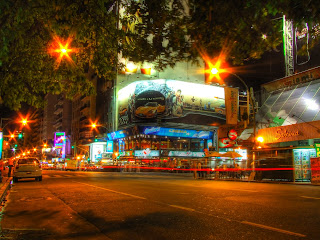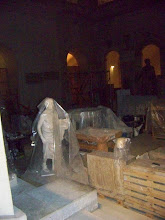
My novel and the shadows took him was about to die. No one was reading it. No one cared about it.
There was no author to promote it, to read from it, to tell people about it.
He was in Argentina talking to angels.
One night, I was walking along Avenida Santa Fe, one of the busiest streets in the city, people walking at all hours of night, a cafe at ever corner, when something flashed in my eye, some kind of sharp light.
I was crossing an intersection, and I looked away from the light and into the eyes of people crossing in the opposite direction.

I kept looking into people’s eyes as I stepped onto the sidewalk.
I looked into as many eyes as I could, people sitting in sidewalk cafes, people walking opposite me, people sitting on the ground begging, people looking into shop windows.
Suddenly I saw lights bursting out of their heads.
This is hard to describe, but I saw it.
Lights came from people’s heads and reached all the way to up into the sky. I looked up and saw the yellow glow that covers the city at night.
I could see light pouring from everybody's head, and sometimes, the light was strong, like on children pulling carts full of cardboard and some old ladies begging in front of the church steps, light shooting up from their heads like they were standing under the beam of a transporter. On other people the lights were more dull, as if the person from who it shot was barely alive, or maybe, people who had so much darkness within them that the light barely filtered through their heads and shot up to the heavens.

I knew I was seeing something beyond the veil, like the energy of God shooting in and out of all people, or maybe I was seeing some version of human auras. But I knew something was about to change in the way I see reality.
Nothing else happened that night, and unfortunately I would never see those lights again, not with the same intensity, because the next day I got an email from Elaine, the lady who was watching my dog during my year off.
Felix was in trouble, she wrote. He missed me so much that no fence or dog kennel could keep him in.

He destroyed everything and escaped, running across the city, across busy boulevards and big parking lots, until he found a spot that smelled familiar to him, the parks we used to walk in, the stores we used to shop at, the porch of the house where we used to live.
One time a friend of hers, who had had only seen Felix once, saw him standing outside of Walgreens, waiting at the door.
“Felix?” she asked, approaching the dog, who kept looking at the door of the store and all the people coming in and out.
She looked at his collar and saw that it was indeed Felix.
She called Elaine and told her where he was, and Elaine came and got him.
It was the Walgreen’s where we used to walk together, and I would tell Felix to stay, and I would go inside and get what I needed, while he waited by the door, certain his daddy was coming back.
“He misses you so much,” Elaine wrote.
She tired keeping him indoors, but he tried to get out and go look for me, and he destroyed her blinds, her door, and the alarm system by the door.
This had been going on for months, and bless her generous soul, she didn’t say anything to me, because she didn’t want to take my year abroad away from me. But now, Elaine was very ill and had to go to the hospital.
Another friend picked Felix up from Elaine’s, but when he started destroying her house too, trying to get out, she said she was sorry, but I had to come and get him.
 Either I had to send Felix to a kennel, where he probably would have died of fear, or I had to give up my year in Buenos Aires.
Either I had to send Felix to a kennel, where he probably would have died of fear, or I had to give up my year in Buenos Aires.I went home.
Felix was so excited to see me he jumped up and down and got on his back and cried for half an hour. We both cried.
Before I had left for Buenos Aires, I had sold my car, my furniture, and I had rented out my house. I had nowhere to go.
I took some money from the bank, a good chunk of what I had planned on living off of, and I bought a used Saturn.
Felix and I jumped in and drove across the country, to California, where we spent the next four months couch surfing. It was the happiest time of his life. We were together 24/7. We were on the road most of the time, stopping to run on beaches
 or on the banks of rivers or through city parks we had never seen before.
or on the banks of rivers or through city parks we had never seen before. When I slept on someone’s couch, he slept right there on the floor next to me, occasionally touching my hand with his cold nose, just to make sure I was still there.
It wasn’t what I had planned to do for my year away from teaching, but it turned out to be the best thing that could have happened to me, to us, not only for the great time I spent on the couches of family and friends, to feel all their love, to get to know them better, but it kept my novel alive.
I had spent a lot of my money on the car, on gas, on food, so I needed to find a way to make some money.
That was when I set up readings for shadows. I visited several colleges and universities, and even some high school students, I did signings, I spoke with students about being a writer, and I did signings at bookstores. At one event, a Young Writer’s Conference in Fresno, I read to about a thousand people. I read from and the shadows took him. At the readings, people bought the book, a bunch of people, and some professors at those readings started using it in their classes. It went from one million on Amazon when I was in Buenos Aires to under a hundred thousand when I was home in California.
I know, that doesn't sound like much, almost a hundred thousand books selling at that time better than mine, but I didn't become a bestseller, I became a midlist writer.
A month later it came out in paperback.
I hate to say, Felix died this summer, a few years after our time in California.
It was very hard on us. He was a family member.
It’s funny to think that if he hadn’t been around, shadows wouldn’t be around.
It’s still used in a lot of Latino/a literature classes, thanks to my hooshker dooshker doo.














